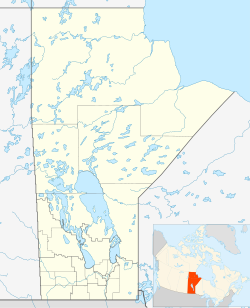Northlands Denesuline First Nation
| [[image:|250px]] | |
| People | Dene and Denesuline |
|---|---|
| Headquarters | Lac Brochet, Manitoba 58°36′58″N 101°30′00″W / 58.61611°N 101.50000°W |
| Government | |
| Chief | Simon Denechezhe |
| Tribal Council | |
| Keewatin Tribal Council | |
The Northlands Denesuline First Nation (Chipewyan: ᓂ ᗂᘚ ᑌᓀ, Nįh hots’į Dene) is a First Nations band government in northwestern Manitoba, Canada. This Dene or Denesuline population were part of a larger group once called the "Caribou-eaters".
The community of Lac Brochet or Dahlu T’ua[1](Chipewyan: ᑕᐤᕊ ᕤᐧᐁ, Dahlu T’ua) ('Jackfish Lake')[2] is the administrative centre of the Northlands First Nation. Seven-hundred-twenty residents of Lac Brochet chose Dene as their mother tongue in 2011. English was spoken by most of the population.[3]
Territory[edit]
The territories of the First Nation include five parcels of land:[4]
- Lac Brochet 197A — with 464.30 hectares (1,147.3 acres), contains the community of Lac Brochet
- Sheth Chok — with 1,213.60 hectares (2,998.9 acres)
- Thuycholeeni — with 47.50 hectares (117.4 acres)
- Thuycholeeni Aze — with 201 hectares (500 acres)
- Tthekale Nu — with 211 hectares (520 acres)
Membership[edit]
As of February 2013 the total membership of Northland First Nation was 1,024 with 868 members living on-reserve and 156 members living off-reserve.[4]
The First Nation is governed by a Chief and six councillors [4] and is affiliated with the Keewatin Tribal Council.[4] The Keewatin Tribal Council with its head office in Thompson represents eleven First Nations in Northern Manitoba.[5]
See also[edit]
References[edit]
- ^ Manitoba First Nations Education Resources - Traditional First Nation Community Names
- ^ "Manitoba First Nations Education Resource Centre Inc. - Traditional First Nations Community Names" (PDF). Archived from the original (PDF) on 2021-12-04. Retrieved 2020-11-24.
- ^ "Canada Census 2011 Community Profile". Retrieved 2013-03-23.
- ^ a b c d "AANDC (Registered Population)". Crown–Indigenous Relations and Northern Affairs Canada. Government of Canada. Retrieved 2013-03-23.
- ^ "Keewatin Tribal Council Website". Archived from the original on 2013-01-04. Retrieved 2013-03-23.

